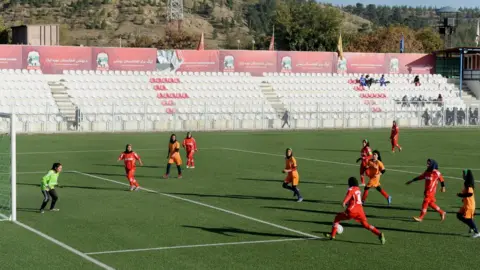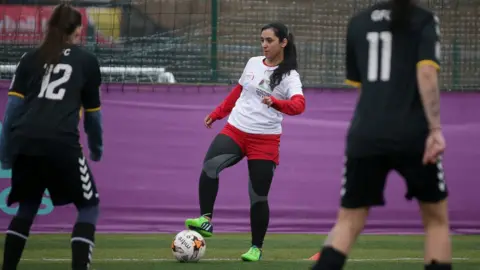Afghan women's football dream turns into nightmare
 AFP
AFPIn post-Taliban Afghanistan, the women's football team was hailed globally as a symbol of the new freedoms enjoyed by the country's women.
But now one of Afghanistan's top sports officials has admitted that female footballers - who defied hard-liners and militants by daring to take to the field in the first place - have been sexually abused. And it's not only football - he admitted the problem extends to other sports too.
Most women athletes are too frightened to speak publicly about alleged abuse by coaches and sporting officials. But several have now disclosed privately to the BBC what they have experienced.
The scandal has exploded in the last few days. On Friday, football's governing body Fifa said it was investigating claims made by women in the national football squad. The Afghan Attorney General's Office then announced its own investigation too.
On Monday, President Ashraf Ghani addressed the allegations head on, saying they were "shocking to all Afghans".
"Even if mere allegations cause our people to stop sending their sons and daughters to sports, we need to act immediately and comprehensively," he said.
Hummel, a Danish sportswear company, has pulled sponsorship of the Afghan Football Federation (AFF), which is at the heart of the allegations.
Sayed Alireza Aqazada, the secretary general of the federation, whose president Keramuddin Karim is among the accused, repeated previous denials. The women's stories aren't true, he said. No sexual harassment had ever been carried out against any female player.
But the furore is showing no signs of abating. Questions were asked in both houses of Afghanistan's parliament on Monday. Then Hafizullah Rahimi, the head of Afghanistan's Olympic committee, made a surprising statement to reporters in Kabul.
"Sadly, these sorts of concerns have reached us," he said. "Sexual abuse does exist, not only within the Football Federation but in other sports federations as well. We have to fight it."
 AFP
AFPIt's the first formal acknowledgement that persistent allegations made by former members of the women's national football team of rampant abuse by male coaches and others in positions of power may be credible.
Many of the allegations have come from Khalida Popal, a former captain of the Afghan women's national football team who also served as its programme director. She risked her life as a teenager to play football in secret - when Afghanistan was still under Taliban rule. In order not to get caught she and her friends played in silence so the Taliban guards on the other side of the school wall wouldn't hear them.
Speaking to the BBC from Denmark, where she has lived since 2011, after fleeing death threats in Afghanistan, she said she had witnessed first-hand widespread physical and sexual abuse of girls and young women by coaches and federation officials. Girls complained to her about a range of abuse, from rape to sexual touching and harassment.
She says she almost lost hope of anything being done about it after she started to document abuse by two coaches. She took her findings to the Afghan Football Federation several years ago.
"Instead of removing them or punishing them", she said, "they were promoted."
Some of the key culprits, she claims, are powerful figures in Afghanistan with close links to government. Officials in the federation would tell players that they could get them on the team list and give them money if they had sex with them, she said.
The BBC has spoken to several young women still living in Afghanistan - including some athletes from sports other than football - who tell similar stories of sexual harassment and bullying. They say the abuse often happened when they were competing to get a place in the national team or for the chance to train or play overseas. One says she was told: "Show me how beautiful you are because only beautiful girls will get on the team."
 AFP
AFPThe allegations about the women's football team have particular resonance because it was earlier celebrated internationally as a symbol of a new, more liberal Afghanistan - and a showcase for the freedoms enjoyed by girls and young women after the fall of the Taliban in 2001.
The fact that the football stadium in Kabul where the team trained was once the venue for Taliban executions only emphasised the contrast.
The irony isn't lost on Khalida Popal. When she was the football team's programme director, she recruited American female coaches and many Afghan women from the diaspora. The Afghan women, she said, "dreamed of doing something for their country, of supporting their sisters back in Afghanistan, of developing a strong national team that represents a positive image of the women of Afghanistan".
"But unfortunately men tried to destroy our programme."
She says that since her allegations were published on Friday in The Guardian newspaper, she's heard from a dozen men and women who have thanked her for speaking out, some tearfully, and said they had similar experiences but were too frightened to come forward.
"I know my voice can change so many lives," she told me. "I know my voice can change the system."
Additional reporting by the BBC's Afghan Service.